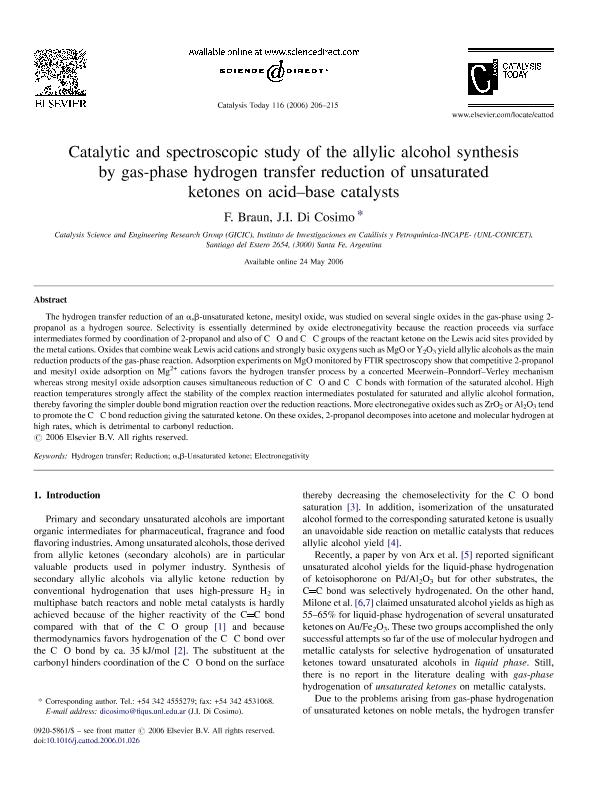Artículo
Catalytic and spectroscopic study of the allylic alcohol synthesis by gas-phase hydrogen transfer reduction of unsaturated ketones on acid-base catalysts
Fecha de publicación:
08/2006
Editorial:
Elsevier Science
Revista:
Catalysis Today
ISSN:
0920-5861
Idioma:
Inglés
Tipo de recurso:
Artículo publicado
Clasificación temática:
Resumen
The hydrogen transfer reduction of an α,β-unsaturated ketone, mesityl oxide, was studied on several single oxides in the gas-phase using 2-propanol as a hydrogen source. Selectivity is essentially determined by oxide electronegativity because the reaction proceeds via surface intermediates formed by coordination of 2-propanol and also of C{double bond, long}O and C{double bond, long}C groups of the reactant ketone on the Lewis acid sites provided by the metal cations. Oxides that combine weak Lewis acid cations and strongly basic oxygens such as MgO or Y2O3 yield allylic alcohols as the main reduction products of the gas-phase reaction. Adsorption experiments on MgO monitored by FTIR spectroscopy show that competitive 2-propanol and mesityl oxide adsorption on Mg2+ cations favors the hydrogen transfer process by a concerted Meerwein-Ponndorf-Verley mechanism whereas strong mesityl oxide adsorption causes simultaneous reduction of C{double bond, long}O and C{double bond, long}C bonds with formation of the saturated alcohol. High reaction temperatures strongly affect the stability of the complex reaction intermediates postulated for saturated and allylic alcohol formation, thereby favoring the simpler double bond migration reaction over the reduction reactions. More electronegative oxides such as ZrO2 or Al2O3 tend to promote the C{double bond, long}C bond reduction giving the saturated ketone. On these oxides, 2-propanol decomposes into acetone and molecular hydrogen at high rates, which is detrimental to carbonyl reduction.
Archivos asociados
Licencia
Identificadores
Colecciones
Articulos(INCAPE)
Articulos de INST.DE INVEST.EN CATALISIS Y PETROQUIMICA "ING. JOSE MIGUEL PARERA"
Articulos de INST.DE INVEST.EN CATALISIS Y PETROQUIMICA "ING. JOSE MIGUEL PARERA"
Citación
Braun, Fernando; Di Cosimo, Juana Isabel; Catalytic and spectroscopic study of the allylic alcohol synthesis by gas-phase hydrogen transfer reduction of unsaturated ketones on acid-base catalysts; Elsevier Science; Catalysis Today; 116; 2 SPEC. ISS.; 8-2006; 206-215
Compartir
Altmétricas




